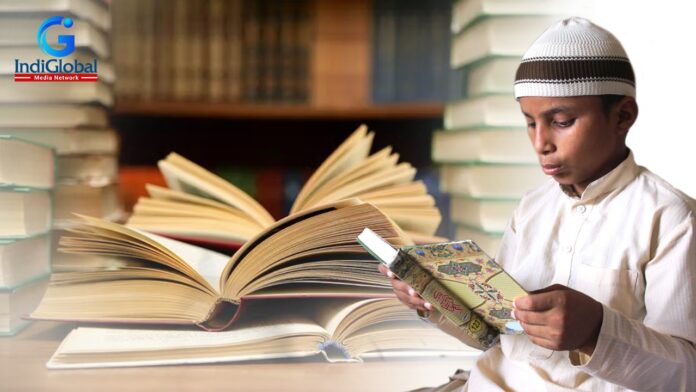- Henceforth, teachers will have to clear TET to teach at madrasas
- Financial aid to madrasas will be withdrawn failing to comply with new guidelines set by UP Govt
- There are 560 aided madrasas in the state employing 8,400 teachers at present
IndiGlobal Bureau
 The UP Government issued directives to the madrasas in the state to modernise the curriculum and give importance to subjects like Hindi, English, science, mathematics, and social science. Minister of state for minority welfare, Danish Azad stated that there will be no tinkering with the Islamic education being provided currently. However, unlike the past where education was heavily loaded with religious discourses, this time the ratio is tilted towards modern education. The ratio would be thus: 20 percent deeni education and 80 per cent modern education.
The UP Government issued directives to the madrasas in the state to modernise the curriculum and give importance to subjects like Hindi, English, science, mathematics, and social science. Minister of state for minority welfare, Danish Azad stated that there will be no tinkering with the Islamic education being provided currently. However, unlike the past where education was heavily loaded with religious discourses, this time the ratio is tilted towards modern education. The ratio would be thus: 20 percent deeni education and 80 per cent modern education.
The Yogi led UP Government under the Madrasa Modernisation Scheme plans to only allow Teacher Eligibility Test (TET) qualified teachers to teach at madrasas from now on. Currently, the teachers are recruited by individual management of madrasas & minimum qualification is a graduation and a B.ed. degree.
Iftikhar Ahmed Javed, chairman of the UP Board of Madrasa Education, said that under the proposed scheme, a separate teachers’ eligibility test will be held by the Basic Education Board of the state. Earlier, in 2018, the UP government introduced the NCERT curriculum in Madrasas but did not change the teaching conditions as the performance of students in science and social sciences remained below standard.
 For a long time, there have been voices even from the Muslim intelligentsia for overhauling madrasa education and making it modern so that the students get jobs.
For a long time, there have been voices even from the Muslim intelligentsia for overhauling madrasa education and making it modern so that the students get jobs.
In the meanwhile, the Madrasa Education Board sent a letter to all district minority welfare officers, asking them to put up a list of successful alumni outside each madrasa along with their educational and professional qualifications.
The message that is being sent out is to boost the confidence of the common man that people who study at the madrasas also go on to get good jobs. There have been IAS officers too who studied in madrasas.








